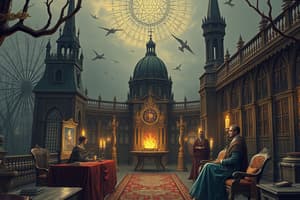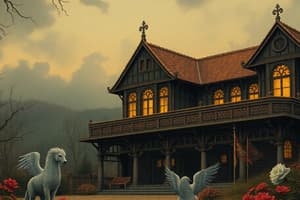Podcast
Questions and Answers
What does Banquo's ghost symbolize in the play?
What does Banquo's ghost symbolize in the play?
- Macbeth's honor
- Macbeth's bravery
- Macbeth's guilt and paranoia (correct)
- Macbeth's wisdom
What is the significance of the witches' prophecies in the play?
What is the significance of the witches' prophecies in the play?
- They serve as a catalyst for Macbeth's descent into madness and tyranny (correct)
- They provide comic relief
- They serve as a distraction from the main plot
- They are a minor aspect of the play
What is a result of Macbeth's descent into madness?
What is a result of Macbeth's descent into madness?
- He becomes increasingly tyrannical and disconnected from reality (correct)
- He becomes more humble and submissive
- He becomes more confident and assertive
- He becomes more rational and calm
What is Lady Macbeth's role in the play?
What is Lady Macbeth's role in the play?
What do the witches' prophecies foretell?
What do the witches' prophecies foretell?
What is the significance of Banquo's ghost in the play?
What is the significance of Banquo's ghost in the play?
What is the result of Macbeth's growing instability and fear of being discovered?
What is the result of Macbeth's growing instability and fear of being discovered?
What is the role of omens in the play?
What is the role of omens in the play?
What is the significance of Macbeth's reaction to Banquo's ghost?
What is the significance of Macbeth's reaction to Banquo's ghost?
What is the result of Lady Macbeth's push for Macbeth to commit the murder?
What is the result of Lady Macbeth's push for Macbeth to commit the murder?
Flashcards are hidden until you start studying
Study Notes
Banquo's Ghost
- Banquo's ghost appears to Macbeth at a banquet, symbolizing his guilt and paranoia
- Macbeth is the only one who can see the ghost, highlighting his own mental state
- The ghost's presence serves as a reminder of Macbeth's role in Banquo's murder
- Macbeth's reaction to the ghost shows his growing instability and fear of being discovered
Prophecies And Omens
- The witches' prophecies continue to play a significant role in Macbeth's actions
- Macbeth becomes obsessed with the prophecy that Banquo's sons will become kings
- The witches' prophecies serve as a catalyst for Macbeth's descent into madness and tyranny
- Omens such as the ghost and the witches' prophecies foreshadow the tragic events that will unfold
Macbeth's Descent Into Madness
- Macbeth's descent into madness is a result of his own guilt, paranoia, and the witches' prophecies
- He becomes increasingly tyrannical and disconnected from reality
- Macbeth's actions become more erratic and violent, leading to the death of Macduff's family
- His madness is a manifestation of the consequences of his own actions
Lady Macbeth's Role
- Lady Macbeth plays a significant role in Macbeth's downfall, as she pushes him to commit the murder
- However, she also begins to show signs of guilt and paranoia, including sleepwalking and hallucinations
- Lady Macbeth's role in the play shifts from being a driving force behind Macbeth's actions to being a victim of her own guilt
- Her character serves as a foil to Macbeth's, highlighting the consequences of their actions
The Witches' Prophecies
- The witches' prophecies continue to drive the plot of the play
- Macbeth becomes obsessed with the prophecy that he will be king until Birnam Wood comes to Dunsinane
- The witches' prophecies also foretell the death of Macduff's family and the rise of Malcolm to the throne
- The prophecies serve as a reminder of the supernatural forces that are at play in the play, and the consequences of Macbeth's actions
Banquo's Ghost
- Banquo's ghost haunts Macbeth, symbolizing his guilt and paranoia, highlighting the consequences of his murder.
- As the only one who can see the ghost, Macbeth's mental state is revealed, and his instability is exposed.
- The ghost serves as a reminder of Macbeth's role in Banquo's murder, emphasizing his culpability.
Prophecies And Omens
- The witches' prophecies continue to influence Macbeth's actions, driving the plot and foreshadowing events.
- Macbeth becomes obsessed with the prophecy that Banquo's sons will become kings, driving his descent into madness.
- The prophecies serve as a catalyst for Macbeth's tyranny, highlighting the supernatural forces at play.
Macbeth's Descent Into Madness
- Macbeth's madness is a result of his guilt, paranoia, and the witches' prophecies, leading to erratic and violent behavior.
- His actions become increasingly tyrannical, detached from reality, and culminate in the death of Macduff's family.
- Macbeth's madness is a manifestation of the consequences of his own actions, highlighting the tragic events unfolding.
Lady Macbeth's Role
- Lady Macbeth plays a significant role in driving Macbeth to commit the murder, but later shows signs of guilt and paranoia.
- Her character shifts from being a driving force behind Macbeth's actions to being a victim of her own guilt, highlighting the consequences of their actions.
- Lady Macbeth's character serves as a foil to Macbeth's, emphasizing the devastating effects of their actions.
The Witches' Prophecies And Omens
- The witches' prophecies continue to drive the plot, foretelling events, and shaping Macbeth's actions.
- Macbeth becomes obsessed with the prophecy that he will be king until Birnam Wood comes to Dunsinane, highlighting his descent into madness.
- The prophecies foretell the death of Macduff's family and the rise of Malcolm to the throne, emphasizing the supernatural forces at play.
Studying That Suits You
Use AI to generate personalized quizzes and flashcards to suit your learning preferences.




